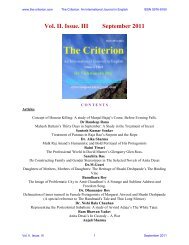Albert Camus: The Rebel Absurdist - The Criterion: An International ...
Albert Camus: The Rebel Absurdist - The Criterion: An International ...
Albert Camus: The Rebel Absurdist - The Criterion: An International ...
You also want an ePaper? Increase the reach of your titles
YUMPU automatically turns print PDFs into web optimized ePapers that Google loves.
www.the-criterion.com <strong>The</strong> <strong>Criterion</strong>: <strong>An</strong> <strong>International</strong> Journal in English ISSN 0976-8165<br />
<strong>Camus</strong>’ romanticism is almost mystical. “I shall take little girl by the hand and<br />
have her sit beside me. <strong>The</strong>re she will look at me steadily and in the eyes of one another<br />
we shall follow the slow sea journeys toward unknown waters….” Here unknown waters<br />
seem to symbolize transcendence. For the mystics depth perception of phenomena leads<br />
to unknown essences the vision of which lifts man out of the world of ego with all its<br />
cares.<br />
According to <strong>Camus</strong> a nihilistic approach ought not to make human beings and<br />
human life valueless. On the contrary, it demands that one place particular value on these<br />
things. <strong>The</strong> argument is that because man is “the one creature whose desire [for value and<br />
meaning] is constantly thwarted in the world,” it follows that “man himself possesses value<br />
and meaning.” It is precisely by reference to value and meaning that he judges his human<br />
condition to be valueless and meaningless. However as Cruickshank has observed <strong>Camus</strong> is<br />
not claiming objective and absolute meaning for man. What he is saying is that man has<br />
value and meaning for other men.<br />
<strong>Camus</strong> has revolted against the absurd and positively reacted to nihilism in <strong>The</strong><br />
Plague and <strong>The</strong> <strong>Rebel</strong> and traveled far from the initial nihilistic phase of Caligula and Cross<br />
Purpose.<br />
How should we respond to death according to <strong>Camus</strong>? Here <strong>Camus</strong> takes recourse to<br />
irrational leap of faith that he resisted otherwise in other contexts. For an absurdist death<br />
consumes everything; it levels everything. <strong>The</strong>re can hardly be any logical ground for<br />
rejecting Caligula’s reaction to his sister’s death<br />
Opposing trend toward nihilism in European thought <strong>Camus</strong> attempts to resist<br />
despairing consequences of nihilism. According to him absurdity is not to be encountered<br />
with disgruntled heart. Man has meaning. Absurdity of life doesn’t render it absolutely<br />
meaningless. <strong>The</strong>re is enough meaning in ordinary experiences of life, enough joy in them<br />
not to let down man. Even Nietzsche seeks "meaning" in life, but not in manners familiar to<br />
most. “For <strong>Camus</strong>, meaning was in the human experience. Absurdity does not render life<br />
meaningless -- people have meaning because they interact with each other, while remaining<br />
in control of their own destinies.” He has enough faith in human relationships to worry<br />
about the loss of his relationship with God.<br />
For <strong>Camus</strong>, the absurd was “not negative, not a synonym for ‘ridiculous,’ but the<br />
true state of existence. Accepting the view that life is absurd is to embrace a ‘realistic’ view<br />
of life: the absence of universal logic.” According to him living the absurd… means “a total<br />
<strong>The</strong> <strong>Criterion</strong><br />
lack of hope (which is not the same as despair), a permanent reflection (which is not the<br />
same as renunciation), and a conscious dissatisfaction (which is not the same as juvenile<br />
anxiety)."<br />
Although <strong>Camus</strong> probably intended Caligula as a mistaken response to absurd as<br />
Cruickshank has argued yet he has to own this possible response which seems to follow<br />
from his premises quite logically and here many things find expression which are so dear to<br />
<strong>Camus</strong>. <strong>The</strong> following dialogue captures the problematique of absurd man that <strong>Camus</strong> saw<br />
as his hero.<br />
Caesonia : You can’t prevent the sky from being the sky, or a fresh young face<br />
from ageing, or a man’s heart from growing cold.<br />
Caligula [with rising excitement]: I want … I want to drown the sky in the sea, to<br />
infuse ugliness with beauty, to wring a laugh form pain.<br />
Vol. III. Issue. I 9 March 2012
















